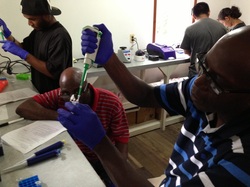 |
|
What we offer

PRI-BioBelize offers a range of workshops from a few days to a week or more where students are introduced to biodiversity research and learn cutting-edge genetic techniques, like DNA barcoding, in order to help gather knowledge about species and ecosystem diversity in Belize.
Through use of a mobile molecular biology laboratory, the first of its kind in Belize, the PRI-BioBelize team travels throughout the country building scientific capacity and hope to contribute to the biological knowledge of Belize by training the next generation of Belizean scientists.
Through use of a mobile molecular biology laboratory, the first of its kind in Belize, the PRI-BioBelize team travels throughout the country building scientific capacity and hope to contribute to the biological knowledge of Belize by training the next generation of Belizean scientists.
What is DNA barcoding?
DNA barcoding is a molecular biology method that identifies species based on the sequence of a small fragment of DNA. DNA barcodes can be generated for known species and act as a future reference, or they can be used to identify the species of an unknown sample. There is no gene that acts as a universal barcode, but the mitochondrial gene, COI, and the chloroplast gene, RBCL, are two of the most commonly used. To date, there are over 130,000 species with vouchered DNA barcodes and over 2 million barcode sequences.
 DOI: 10.1126/science.1230006
DOI: 10.1126/science.1230006
Our DNA barcoding curriculum has been a huge success and we are happy to share its development and results in Science magazine.